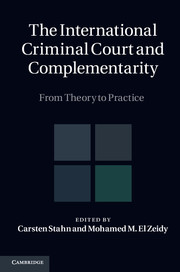Book contents
- Frontmatter
- Contents
- Acknowledgments
- Foreword by HE Judge Sang-Hyun Song
- Foreword by Patricia O’Brien
- Foreword by Silvia A. Fernandez de Gurmendi
- List of abbreviations
- Introduction: bridge over troubled waters?
- PART I General reflections
- PART II Origin and genesis of complementarity
- PART III Analytical dimensions of complementarity
- PART IV Interpretation and application
- PART IV (Continued) Interpretation and application
- PART V Complementarity in perspective
- PART VI Complementarity in practice
- Index
Foreword by Silvia A. Fernandez de Gurmendi
Published online by Cambridge University Press: 05 November 2014
- Frontmatter
- Contents
- Acknowledgments
- Foreword by HE Judge Sang-Hyun Song
- Foreword by Patricia O’Brien
- Foreword by Silvia A. Fernandez de Gurmendi
- List of abbreviations
- Introduction: bridge over troubled waters?
- PART I General reflections
- PART II Origin and genesis of complementarity
- PART III Analytical dimensions of complementarity
- PART IV Interpretation and application
- PART IV (Continued) Interpretation and application
- PART V Complementarity in perspective
- PART VI Complementarity in practice
- Index
Summary
‘Complementarity’ is probably the concept that best describes the nature of the International Criminal Court. However, as usually happens with fundamental concepts, its meaning is open to interpretations and the full range of its theoretical and operational implications is still unclear.
It would not be an over-statement to affirm that the early agreement on a complementarity regime was what made the Court possible. By the time delegations gathered in Rome, complementarity was the only major issue that we had largely managed to resolve -- not because it was easy, but probably because it was such a key feature of the future institution that articulating an acceptable compromise on complementarity appeared as a precondition to making progress in the rest of the negotiating process.
Acomplementarity systemwas indeed essential to defining the relationship between the Court and national states and to determining the limits of their respective spheres of action. Internationalism versus national sovereignty was the inevitable tension underlying the discussions but an abstract debate was pragmatically avoided and delegations were able to bridge their differences by focusing on the practical implications of the principle of complementarity for the activities of the Court.
The concept of complementarity was not new and the main features of the regime eventually adopted for the International Criminal Court were already contained in the 1994 draft statute prepared by the International Law Commission. This draft included the idea of concurrent jurisdiction between international and national jurisdictions but left out the principle of primacy of international jurisdiction that had been granted by the Security Council to the ad hoc tribunals for the former Yugoslavia and Rwanda only a few years before.
- Type
- Chapter
- Information
- The International Criminal Court and ComplementarityFrom Theory to Practice, pp. xxv - xxviiPublisher: Cambridge University PressPrint publication year: 2011



